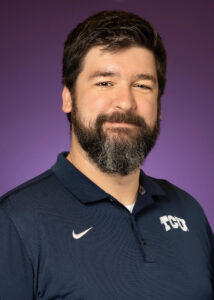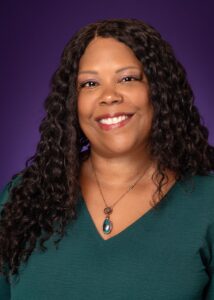 Joe LeConte, M. Ed., LCDC, LPC-Associate
Joe LeConte, M. Ed., LCDC, LPC-Associate
Under the Supervision of Kelley Phillips, LPC-S
Joe has a Bachelor’s degree in Moving Image Arts from the College of Santa Fe and a Master’s degree in Education in Counseling from Texas Christian University. Joe is a Licensed Chemical Dependency Counselor (LCDC) and uses both motivational interviewing and solution-focused techniques to connect with students. Joe cares deeply about helping students to overcome the stresses and difficulties that come during their time in college and believes the most meaningful work occurs when he can understand the client’s point of view. During his time as a graduate student, Joe worked with adolescent clients dealing with substance use issues in a residential treatment facility in Dallas, TX. Joe is also the leader of the supportive gaming community at TCU, where he utilizes tabletop roleplaying games to help students deal with anxiety, loneliness, and a lack of connectedness.
Prior to joining the SURS office, Joe worked as the Audio/Visual Coordinator in the Brown Lupton University Union (BLUU) for nine years. Before TCU, he worked in the film and television industry as a special effects technician. Joe has also worked with multiple theater groups, touring music productions and production companies as a musician, lighting designer, and sound technician. Joe’s wide background gives him a chance to connect with TCU’s diverse student population.
 Kelley Phillips, LPC-S, RYT
Kelley Phillips, LPC-S, RYT
Kelley holds a Bachelor’s degree in Civil Engineering from the University of Alabama and a Master’s degree in Counseling from Texas Wesleyan University. She is a Licensed Professional Counselor Supervisor, a Registered Yoga Teacher, and is trained in Eye Movement Desensitization and Reprocessing (EMDR).
Kelley brings experience as both a Professional School Counselor and as the Lead Crisis Counselor in Crowley ISD, where she supported children, adolescents, and staff through issues such as trauma, grief and loss, behavioral and emotional regulation, substance use, crisis intervention, and school-wide critical incidents. In her counseling work, she primarily uses Solution-Focused strategies to help students identify what’s working, clarify what’s holding them back, and build toward meaningful, lasting change. She also incorporates EMDR, mindfulness, and somatic techniques to support students in healing and growth.
Kelley is passionate about creating a safe, nonjudgmental space where students feel free to express themselves, reconnect with their strengths, and feel seen and heard. She believes that true healing begins when students’ voices are honored, their emotions are validated, and their goals are centered in the therapeutic process.
 Grace Porterfield, Graduate Assistant
Grace Porterfield, Graduate Assistant
Grace holds a Bachelor’s degree in Psychology from Texas Christian University and is working towards her Master’s degree in Clinical Mental Health Counseling at TCU. Grace uses a combination of solution-focused and motivational interviewing skills to connect with and get to know students. During her time as a graduate student, Grace has worked exclusively with the Substance Use and Recovery Services office, supporting collegiate students dealing with substance issues, relational conflicts, stress, anxiety, and depression.
Grace’s goal as a future licensed professional counselor is to work with students and other young adults to help discover their own strengths and resources. Grace believes that students already possess the values, goals, strengths, and solutions within themselves. She has an interest and passion for working with substance use, familial and relationship conflict, anxiety, depression, and body image. She is so excited to be continuing her journey with the Substance Use and Recovery Services office at TCU as a Graduate Assistant and intern!
 Katy Brown-Wadford, Graduate Intern
Katy Brown-Wadford, Graduate Intern
Katy earned her Bachelor’s degree in Psychology from Texas Woman’s University and is currently pursuing her Master’s degree in Clinical Mental Health Counseling at Texas Christian University. She is completing her internship with TCU’s Substance Use and Recovery Services office, where she works with students navigating substance use concerns, alcohol violations, stress, relationship challenges, anxiety, and depression. In her counseling work, Katy draws from Solution-Focused Brief Therapy and Motivational Interviewing to meet clients where they are and help them identify their own strengths, values, and goals. She is passionate about creating a supportive, nonjudgmental space that empowers students to move forward in meaningful ways.
Katy’s long-term goal as a future Licensed Professional Counselor is to specialize in Trust-Based Relational Intervention (TBRI) and Eye Movement Desensitization and Reprocessing (EMDR) to help children and adolescents who have experienced trauma. She also maintains a strong interest in substance use, grief, family dynamics, and anxiety. Katy is excited to be growing her skills and experience through her internship with Substance Use and Recovery Services.

 Joe LeConte, M. Ed., LCDC, LPC-Associate
Joe LeConte, M. Ed., LCDC, LPC-Associate Kelley Phillips, LPC-S, RYT
Kelley Phillips, LPC-S, RYT Grace Porterfield, Graduate Assistant
Grace Porterfield, Graduate Assistant Katy Brown-Wadford, Graduate Intern
Katy Brown-Wadford, Graduate Intern